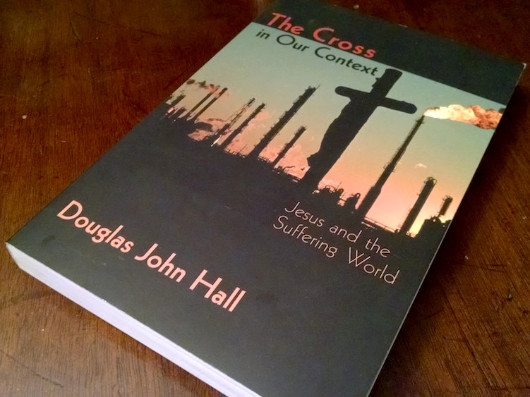Douglas John Hall, Celebrating Ninety Years
The year 1928 was a good one for theologians
 The year 1928 was a good one for theologians. In addition to the esteemed Professor Marty, the Canadian theologian Douglas John Hall celebrated his ninetieth birthday on March 23. Hall was born in Ingersoll, Ontario; attended high school and business school in Woodstock, Ontario; studied composition and piano at the Royal Conservatory of Music in Toronto; and graduated from the University of Western Ontario in 1953. He went on to study for the ministry at Union Theological Seminary in New York City, where he received his master’s and doctoral degrees. At Union, Hall was a student of Reinhold Niebuhr, Paul Tillich, and John Coleman Bennett, among others. He served as a pastor in the United Church of Canada and taught at the Universities of Waterloo and Saskatchewan. In 1975 Hall moved to the School of Religious Studies at McGill University in Montreal, where he currently resides.
The year 1928 was a good one for theologians. In addition to the esteemed Professor Marty, the Canadian theologian Douglas John Hall celebrated his ninetieth birthday on March 23. Hall was born in Ingersoll, Ontario; attended high school and business school in Woodstock, Ontario; studied composition and piano at the Royal Conservatory of Music in Toronto; and graduated from the University of Western Ontario in 1953. He went on to study for the ministry at Union Theological Seminary in New York City, where he received his master’s and doctoral degrees. At Union, Hall was a student of Reinhold Niebuhr, Paul Tillich, and John Coleman Bennett, among others. He served as a pastor in the United Church of Canada and taught at the Universities of Waterloo and Saskatchewan. In 1975 Hall moved to the School of Religious Studies at McGill University in Montreal, where he currently resides.
Above all else, Hall is a contextual theologian. His three-volume systematic theology about thinking, professing, and confessing the faith has the overarching title A Trilogy: Christian Theology in a North American Context. Hall is also a modern-day interpreter of what Jürgen Moltmann has called that “never much loved” but absolutely needed theology of the cross, in contrast to what Martin Luther called the theology of glory. Hall reminds us that Luther may have named the theology of the cross, but its roots are in the Apostle Paul and the prophets who preceded him. Hall has provided his interpretation of this theology in several books and numerous papers published over a period of more than thirty years. In some ways, Hall is an unlikely theologian of the cross given that he is not Lutheran and did most of his work in a province that experienced the “Quiet Revolution” of the 1960s, which resulted in a dramatic decline in church attendance, even as other cultural changes across Canada similarly affected Hall’s own United Church of Canada.
Hall has written extensively about how the church can survive in an era in which it is no longer triumphant. He asks in his 2010 article in The Christian Century, “What then is the mission of a church that can no longer count on its favored status in Western civilization to ensure its meaning and its continued existence?” Hall’s answer is that the church must recognize its failure to act according to the Gospel and begin to witness and serve outside or on the edge of the dominant culture. For the church to survive and be faithful to its message, it must change, or ultimately die, according to Hall.
Hall has continued to write well into his eighties, and in 2011 published a highly personal book, The Messenger: Friendship, Faith, and Finding One’s Way. This book describes how Hall found his way to the ministry mainly through what he calls a messenger, Bob Miller, an older friend and minister in the United Church of Canada. For Hall, there is the messenger, the message, the receiver of the message, and the context or “life and times” in which the message is received. The message turned Hall’s life around and led him from a life in music to one in ministry and theology. In describing the context of his life as a theologian, Hall reminds us of the importance of others and the messages they deliver.
Like his teacher, Reinhold Niebuhr, and his contemporary, Marty, Douglas John Hall is a public theologian and messenger in the best sense of these words. As a theologian he is aware of his own limitations, heeding the warning of Augustine, “If you think you comprehend, then it’s not God you’re talking about!” His writings are grounded in reality and communicate strong convictions regarding the possibilities and limitations of the human experience. Most importantly, his work displays respect for the reader and engages the reader as a fellow traveler whose thinking is driven by faith. For all of this, we honor and give thanks for Douglas John Hall.
References
- Hall, Douglas John. “Cross and context: How my mind has changed.” The Christian Century. August 26, 2010.
- —. The Cross in Our Context: Jesus and the Suffering World. Fortress Press, 2003.
- —. God and Human Suffering: An Exercise in the Theology of the Cross. Augsburg, 1986.
- —. Lighten Our Darkness: Towards an Indigenous Theology of the Cross. Westminster, 1976.
- —. The Messenger: Friendship, Faith, and Finding One’s Way. Cascade Books, 2011.
Photo Credit: Brett Colasacco
 Author, Charles (Chuck) Maynard, is a sociologist and research professor emeritus in the Department of Health Services at the University of Washington. He attended Luther Theological Seminary during the 1970-71 academic year. Author, Charles (Chuck) Maynard, is a sociologist and research professor emeritus in the Department of Health Services at the University of Washington. He attended Luther Theological Seminary during the 1970-71 academic year. |
Sightings is edited by Brett Colasacco (AB’07, MDiv’10), a PhD candidate in Religion, Literature, and Visual Culture at the University of Chicago Divinity School. Sign up here to receive Sightings via email. You can also follow us on Facebook and Twitter.

